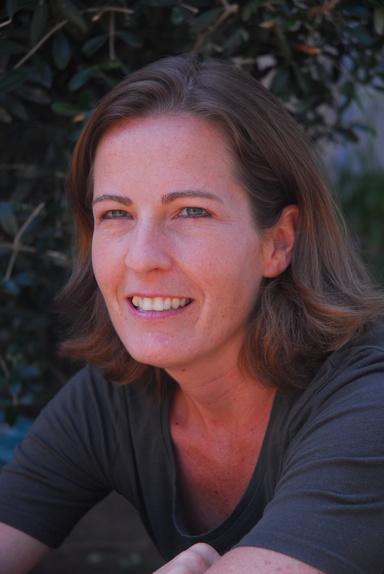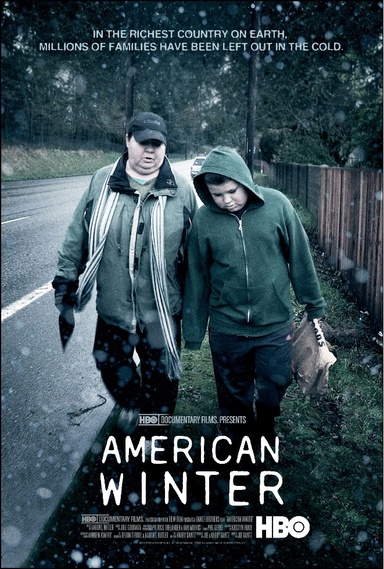In 2010, when Devon Terrill began working as a co-producer on American Winter, a new documentary about families struggling in the wake of the worst U.S. recession in 80 years, she found that the subject matter hit close to home.

On her own block in a bustling neighborhood of Los Angeles, dozens of apartments suddenly were vacant, and many restaurants and businesses along the area’s busy commercial boulevard had gone bust. The economic downturn took a toll on her family’s finances, too—along with those of most of her friends, who, like her, had young children.
Even though she has a college degree from the University of Iowa and has been successful working in the film industry, Terrill says she still is a long way from achieving one of the pillars of the middle-class American dream: economic security.
“It only takes one bump in the road to put families in financial crisis nowadays,” says the Marshalltown, Iowa, native who received a Bachelor of Arts in comparative literature from the UI College of Liberal Arts and Sciences in 1996. “Working on this film was powerful because I could relate to the stress of insecurity that the families in the film were feeling, but I also knew my family had enough food to eat and a roof over our heads—and a family in Iowa that will be there for us if we need them. Millions of Americans are not so lucky.”

American Winter, which debuts on HBO on March 18 and will be screened March 30 at the Englert Theatre in Iowa City, follows eight families in Portland, Ore., that utilized the city’s 211 crisis hotline during the winter months of 2011-12. There is Diedre, a college graduate who took a minimum-wage job after being laid off and has to supplement that income by selling plasma and salvaging scrap metal in order to fill the fridge for her family of five. Shanon is a single mother struggling to pay medical expenses her insurance won’t cover after her daughter is diagnosed with a stomach condition requiring hospitalization.
Ben, who lost his home to foreclosure after his job was cut, explains how he and his wife used to talk about their dreams and what they would do with their lives: “Forget the dreams,” he says in the film. “How do we make it to tomorrow? Tomorrow’s the dream. This dinner is the dream.”
Telling a story—and more
Putting a human face on the recession and showing the impact of cuts to safety-net programs during a time of unprecedented need were the main goals of the 90-minute film, Terrill says. Another was to break down stereotypes.
“The biggest misconception is that people in poverty are takers or deadbeats, that they’re taking advantage of the system. But the truth is that most of them have worked since they were teenagers, and they don’t want to be in poverty. When you’re struggling every single day—even with a full-time job—to put food on the table, it is hard to get beyond that,” says Terrill. “As a country, we have to look at these stories honestly and stop framing the discussion in divisive political terms. Once we start seeing that we’re all in this together, we can start to work toward positive change.”
Terrill became involved in the project through her association with the Emmy-winning sibling duo, Joe and Harry Gantz, and their production company, View Film, with whom she has worked for the past eight years. The Gantzes, who co-directed American Winter and also created HBO’s Taxicab Confessions and executive produced the CBS drama The Defenders, are known for their intimate, honest, and often gritty depictions of the human experience. Terrill also produced Pleasure for Sale, the Gantzes’ six-part documentary series for The Sundance Channel about the lives and relationships of legal prostitutes working at a brothel in southern Nevada.
Finding a calling in filmmaking
Terrill hasn’t always worked on documentaries. In fact, she didn’t pursue filmmaking until after her UI graduation. “I’ve always been curious. In high school, I took full advantage of all the electives and extracurriculars available to me—sports, arts, music, debate. I wanted to explore everything.”
The UI campus was a good fit for Terrill, who says she was attracted to the diversity of activity it offered. She didn’t declare a major until after she returned from a yearlong study abroad experience in Austria.
“During my travels when I was abroad, I found that everything I’d been studying made more sense, everything had a context—from history to literature to language. It was a pretty transformative experience,” she says. “I also developed an interest in media and film and how they reflect a culture and inform people’s vision of the future.”
"Iowans have a reputation in L.A. for being pragmatic, focused, and committed. Even though I didn’t go to film school, I was able to think critically and creatively at the same time, and see things through to completion, and that impressed people."
–UI alumna and filmmaker Devon Terrill
Upon her return to Iowa City, Terrill declared a major in comparative literature, an area that, she explains, “tied together my multidisciplinary, cross-cultural interests.” On a whim, she decided to apply for an Academy of Television Arts & Sciences internship that she saw advertised on campus. She was selected, and then assigned to work as a development assistant for Viacom Productions.
“I was thrust into the world of entertainment, and it was a completely different way of approaching things,” she recalls. “I think the tools I picked up from studying overseas allowed me to adapt to a new situation, and being from Iowa was a plus. Iowans have a reputation in L.A. for being pragmatic, focused, and committed. Even though I didn’t go to film school, I was able to think critically and creatively at the same time, and see things through to completion, and that impressed people.”
Documenting disabilities—with honesty and humor
Terrill since has worked on numerous TV series, documentaries, and feature films for Showtime, Fox Searchlight Pictures, Animal Planet, The Travel Channel, and more. The project that perhaps is closest to her heart, however, is an independent film she made with her sister called GORK!, an award-winning documentary that was featured at the 2011 Landlocked Film Festival in Iowa City.
Started more than a decade ago to tell the story of their younger brother, Adam, who has a number of developmental disabilities, including autism, GORK! explores the challenges and rewards the family has faced as he has grown up.
“When we began the project, it felt like political correctness was actually pushing people with disabilities further into the periphery, because people couldn’t find a way to be frank and honest and open in their approach to the subject,” explains Terrill, who directed the film. “We wanted to bring comedy and entertainment into the discussion, to make it more accessible and to give people permission to look deeper and laugh and ultimately learn something.
“Adam is such a compelling and charismatic person, and he is so funny, he was a great character to build a film around. Once we started filming, things weren’t always comedic—in fact, there is a lot of drama and emotion in the film—but the premise that laughter can open the door to understanding was a strong one, and I think we were successful in presenting an honest picture of one family’s experience raising a child with disabilities to adulthood.”
Want to see American Winter?
The Englert Theatre in Iowa City will offer a free screening at 2 p.m. March 30. For more info, visit the Englert website.
For the HBO schedule, click here.
Terrill says she is not sure what project will be on her plate next, noting she could be working on outreach for American Winter for another year as part of the film’s social action campaign.
“Filmmaking is not only storytelling, it’s finding compelling characters and a rich story to tell, developing that story, raising money and convincing people to help you tell the story, and then getting completely immersed in the world of that story until it is ready to present to an audience,” she says. “It is an all-consuming experience that usually stretches over years, and at the end of it, there is a tiny piece of that experience that is the actual film.”
For more information about American Winter, see www.americanwinterfilm.com. To learn more about GORK!, click here.